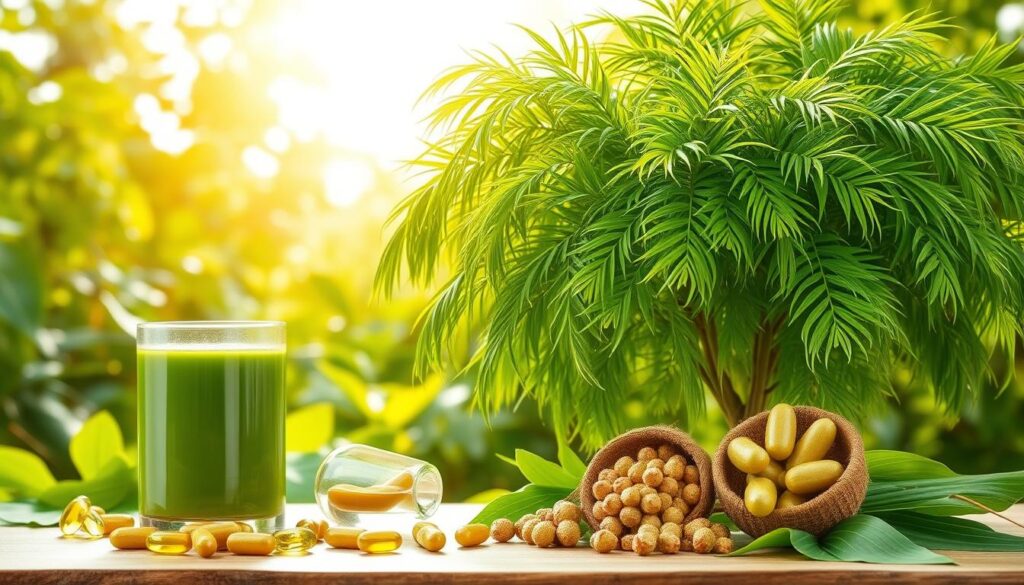Have you heard of the amazing plant called moringa? It’s also known as the miracle tree. Moringa is packed with nutrients and has been used in traditional medicine for years.
But why should you add it to your health routine? Let’s dive into the amazing health benefits of moringa and how it can help you feel your best.
Key Takeaways
- Moringa is a nutrient-dense plant that offers a wide array of potential health benefits.
- It is rich in essential vitamins minerals, and antioxidants that can support overall well being.
- Moringa has been traditionally used to address a variety of health concerns, from skin and hair health to blood sugar management and immune system support.
- Ongoing research suggests moringa may have anti-inflammatory anti-cancer, and anti-bacterial properties.
- Incorporating moringa into your diet or supplementation routine may provide a natural way to boost your overall health and vitality.
Understanding Moringa Nature’s Nutritional Powerhouse
Moringa oleifera known as the miracle tree is a plant full of nutrients. It has been used for centuries in many cultures. This tree is rich in vitamins minerals, and other good compounds making it a superfood.
Essential Vitamins and Minerals
Moringa leaves are full of nutrients. They have a lot of protein, up to 29.4 grams per 100 grams. They also have vitamins B6, C, and A, and minerals like calcium iron, and magnesium.
Traditional Uses Across Cultures
For a long time moringa has been used in medicine and cooking worldwide. In places like India and Pakistan it helps with diabetes arthritis, and skin problems. Now it’s grown in many tropical places, from Africa to Oceania.
Different Parts of the Moringa Tree
The moringa tree is very useful, with each part offering different benefits. Leaves seeds pods, and roots all have unique nutrients and uses. But eating too much can lead to problems with mineral and protein absorption.
| Moringa Tree Part | Nutritional Highlights | Traditional Uses |
|---|---|---|
| Leaves | High in protein vitamins, and minerals | Treat diabetes arthritis, and digestive issues |
| Seeds | Rich in fatty acids and antimicrobial compounds | Purify water and treat skin infections |
| Pods | Contain vitamins, minerals, and antioxidants | Culinary use and treatment of inflammation |
| Roots | Source of phytochemicals and antimicrobial agents | Treat skin infections and rheumatism |
Moringa is a superfood with great health benefits. Its nutritional profile and uses make it valuable for health worldwide.

Why Is Moringa Good For You?
Moringa oleifera, known as the miracle tree is full of essential nutrients. It has a lot of bioactive compounds. This makes moringa a true nutritional powerhouse. Its rich nutritional value and diverse health benefits make it a valuable gift from nature.
One cup of fresh, chopped moringa leaves has 2 grams of protein. This is a great source of plant-based protein. These leaves also give you 19% of the Vitamin B6 you need and 157% of vitamin C per cup of fresh, sliced pods.
Moringa’s antioxidant properties are impressive. Studies show that 1.5 teaspoons of moringa leaf powder daily for three months boosts blood antioxidant levels. The antioxidants like quercetin and chlorogenic acid fight harmful free radicals and reduce oxidative stress.
Also, moringa has anti-inflammatory properties that may help with conditions like rheumatoid arthritis. Adding 50 grams of moringa leaves to a meal can lower blood sugar by 21%. This makes it great for blood sugar management and diabetes control.
Moringa’s health benefits go beyond nutrition and antioxidants. It may help lower cholesterol protect the heart, and regulate blood pressure. This makes moringa a versatile plant with many health benefits.

Read more: Cholesterol Blood Pressure Heart
Moringa oleifera is a remarkable plant with a long history of use in traditional medicine. Its diverse range of health benefits make it a true gift of nature.
Powerful Antioxidant Properties for Overall Health
Moringa oleifera known as the miracle tree is famous for its strong antioxidants. It has vitamins C beta carotene quercetin, and chlorogenic acid. These work together to fight free radicals and lower oxidative stress.
Key Antioxidant Compounds
Moringa leaves are packed with antioxidants. Research shows they have a high antioxidant capacity. This is thanks to their high levels of phenolic compounds.
Fighting Free Radicals
Oxidative stress is linked to diseases like heart disease and cancer. Moringa’s antioxidants fight free radicals. This helps reduce oxidative stress and improves health.
Anti-inflammatory Benefits
Moringa also has anti-inflammatory effects. Its vitamins, flavonoids, and alkaloids can lower body inflammation. This is good for conditions like arthritis and asthma.
| Antioxidant Compounds in Moringa | Key Benefits |
|---|---|
| Vitamin C | Enhances immune function and collagen production |
| Beta-carotene | Converted to vitamin A supports eye and skin health |
| Quercetin | Possesses anti-inflammatory and anti-cancer properties |
| Chlorogenic Acid | Helps regulate blood sugar levels and support heart health |

Moringa is a nutritional powerhouse. It has many antioxidants and anti-inflammatory compounds. This makes it great for overall health and well-being.
Blood Sugar Management and Diabetes Control
Research shows that moringa might help manage blood sugar and control diabetes. Studies found that moringa leaf powder lowers fasting blood sugar and meal spikes.
Moringa’s bioactive compounds, especially isothiocyanates, are key. They boost insulin sensitivity and improve glucose processing. This helps keep blood sugar levels stable naturally.
- Moringa leaves contain quercetin an antioxidant that helps lower blood pressure.
- Chlorogenic acid in moringa stabilizes blood sugar levels and may improve the body’s sugar processing capabilities.
- The recommended dosage of moringa for diabetics is one teaspoon regularly, equivalent to 2 grams, which should be adjusted according to the individual’s condition.
While promising, more human studies are needed to fully grasp moringa’s diabetes management potential. Yet it’s a natural superfood worth considering for health and well-being.

Read more: What are the treatments for type 2 diabetes
| Statistic | Value |
|---|---|
| People affected by pre-diabetes worldwide | 316 million |
| People diagnosed with diabetes worldwide | 387 million |
| People with diabetes who develop neuropathy | 200 million |
| Oil content in Moringa oleifera seeds | 40% |
Moringa has antifungal antiviral antidepressant, and anti-inflammatory properties.
Heart Health and Blood Pressure Benefits
Moringa known as the miracle tree is famous for its nutritional value and health benefits. It’s known to improve heart health and control blood pressure.
Cholesterol-Lowering Effects
Research shows moringa can lower total and LDL bad cholesterol. Its antioxidants like quercetin help reduce cholesterol. This may lower heart disease risk.
Cardiovascular Protection
Moringa is packed with vitamins A, C, and minerals. These nutrients protect the heart. Its anti-inflammatory effects also help prevent heart diseases.
Blood Pressure Regulation
Moringa can lower blood pressure in healthy people. Its antioxidants and compounds relax blood vessels. They help keep sodium and potassium levels balanced, aiding blood pressure control.
Using moringa for heart health can lower cholesterol levels and blood pressure. This promotes better heart health and overall well-being.

Read more: How Fruits and Veggies Support Heart Health
Skin Hair and Natural Beauty Enhancement
Moringa is known as the miracle tree for good reason. It’s packed with nutrients that can make your skin and hair look better. This can help you look more radiant and youthful.
Moringa has antioxidants and anti-inflammatory properties. These can protect your skin from harm and help it heal. It might also be good for your hair, but more research is needed.
Moringa is full of vitamin C, which is great for your skin. It helps make collagen, keeping your skin elastic and firm. It might even reduce wrinkles, making you look younger.
Moringa for Skin Health
A study found that moringa leaf extract in a cream improved skin texture and volume. The cream with moringa worked better than the regular cream. This shows moringa could be great for your skin.
Moringa for Hair Health
Moringa oil is good for your hair too. It can make your hair grow by affecting certain genes. It also has vitamins A, C, and E to moisturize and strengthen your hair.
Moringa is amazing for both your skin and hair. It can make you look and feel more beautiful naturally. By using moringa, you can get radiant skin and healthy vibrant hair.
Digestive Health and Immune System Support
Moringa known as the miracle tree is packed with nutrients. It’s great for your digestive health and immune system. This plant has many beneficial compounds that can greatly improve your well-being.
Stomach Health Benefits
Moringa is amazing for your stomach. It can lower blood sugar spikes after meals by up to 40 milligrams per deciliter. Moringa oil from the seeds also helps wounds heal by boosting collagen in mice. This could help reduce fluid buildup in humans too.
Anti-bacterial Properties
Moringa’s antibacterial powers are impressive. Lab tests show it can stop foodborne pathogens like Staphylococcus aureus and Escherichia coli from growing. This natural defense is great for keeping your gut healthy and preventing digestive problems.
Immune System Boosting
Moringa is also a strong immune booster. It’s full of vitamin C and antioxidants, key for a strong immune system. Research suggests moringa can improve gut health by better absorbing nutrients and making antibiotics more effective.
While more human studies are needed, the current research is promising. Adding moringa to your diet could be a simple way to keep your gut and immune system healthy.
| Health Benefit | Key Findings |
|---|---|
| Stomach Health | Moringa can reduce post-meal blood sugar spikes in people with diabetes by up to 40 mg/dL. Moringa oil may enhance wound healing and reduce fluid accumulation. |
| Anti-bacterial Properties | Moringa leaf extract has been shown to inhibit the growth of foodborne pathogens like Staphylococcus aureus and Escherichia coli. |
| Immune System Boosting | Moringa’s high vitamin C content and other antioxidants may help boost the immune system. Compounds in moringa leaves may improve gut health and antibiotic effectiveness. |
Weight Management and Metabolic Health
Moringa, known as the miracle tree is getting attention for its weight and metabolic health benefits. Studies show it might help manage obesity making it a natural option for better health.
One study with 41 obese people found moringa helped them lose 10.6 pounds more than the placebo group. Another study with 130 overweight people showed moringa helped them lose 11.9 pounds, more than the placebo group.
Moringa’s weight loss benefits come from several areas. It supports weight loss, improves lipid profiles, lowers cholesterol, and enhances insulin sensitivity. Animal studies show these effects, but more human research is needed.
| Nutrient | Amount per 100 grams | Percent of Daily Value (DV) |
|---|---|---|
| Protein | 27 grams | – |
| Fat | 6 grams | – |
| Fiber | 34 grams | – |
| Sugar | 3 grams | – |
| Sodium | 1,361 mg | – |
| Calcium | – | 173% of DV |
| Iron | – | 133% of DV |
| Zinc | – | 27% of DV |
| Magnesium | – | 126% of DV |
| Copper | – | 111% of DV |
| Vitamin A | – | 176% of DV |
Moringa’s rich nutrients and metabolic benefits make it a great natural choice for weight management. While more research is needed, the current evidence is promising. Adding moringa to a healthy lifestyle could support better metabolic health and weight loss.
Moringa’s potential benefits in weight management and metabolic health are exciting, but more human studies are needed to fully understand its impact.
Conclusion
Moringa is known as a superfood for good reasons. It’s packed with nutrients that support health in many ways. Its vitamins, minerals, and antioxidants make it great for a healthy diet and overall wellness.
Research backs up moringa’s benefits like protecting against disease and helping with blood sugar and heart health. But we need more studies to know everything about it. Always talk to a doctor before taking moringa, especially if you’re pregnant or on medication.
The moringa market is growing, and we’ll learn more about its uses soon. Studies on its effects on the brain, immune system, and weight are underway. This could make moringa even more valuable for our health.





